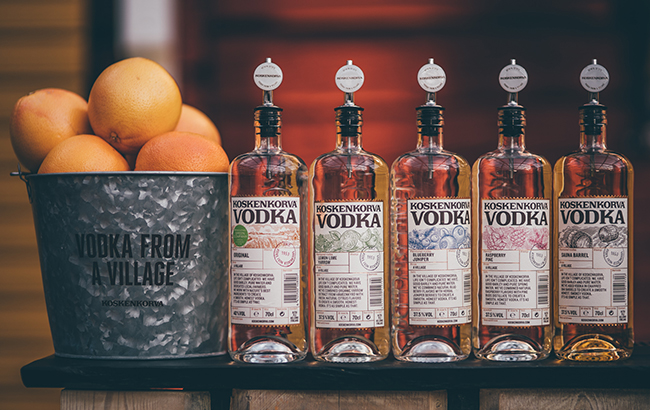This website uses cookies so that we can provide you with the best user experience possible. Cookie information is stored in your browser and performs functions such as recognising you when you return to our website and helping our team to understand which sections of the website you find most interesting and useful.
Anora sees 5.7% FY sales growth
By Alice BrookerKoskenkorva Vodka owner Anora Group saw net sales rise by mid-single digits to reach €702.7 million (US$746.1m) in 2022, however it failed to meet the firm’s expectations.

Anora recorded a 5.7% boost in net sales last year, compared with 2021.
However, it is below CEO Pekka Tennilä’s predictions, resulting from “normalisation after Covid-19”, as wine and spirits volumes in the monopolies “declined significantly”, exchange rates being “unfavourable”, and “record high input costs” for ingredients such as barley.
Plus, sales and marketing costs were considered to be much higher too.
Tennilä said: “The profitability in Q4 [fourth quarter] or full year 2022 didn’t meet our expectations.
“An exceptional €3.2m (US$3.4m) inventory correction on the stock value differences in Globus Wine, recognised in Q4, impacted negatively on the results.
“We have implemented price increases across all of our businesses and markets throughout the year but due to a time lag, they only partially compensated for the cost increases.”
Net sales for the company’s fourth quarter (Q4) reached €221.6m (US$235.3m), a 7.8% increase on 2021 when sales reached €205.6m (US$218.3m).
Anora’s comparable earnings before interest, tax, depreciation and amortisation (EBITDA) was €76.1m (US$80.8), and in 2023, its EBITDA is expected to be between €80-€90m (US$84m-US%95m).
The main contributor to Anora’s Q4 growth was the acquisition of Globus Wine, according to Tennilä, which took place on 1 July 2022.
Full-year net sales excluding Globus Wine were €658.5m (US$699.1m).
“The acquisition of Globus Wine together with growth of [the] industrial segment, and spirits sales growth in international markets, duty free travel retail and exports, contributed positively to sales growth,” added Tennilä.
Tennilä said the market decline in monopoly channels causes sales to slide in Sweden, Norway and Finland.
In 2022, Anora said it saw markets return to normal for wine and spirits after Covid-19, as volumes in the monopolies declined and restrictions were lifted in all markets.
“Consumption has shifted back to on-trade, travel retail and border trade,” Tennilä said.
“However, the war in Ukraine, and the after-effects of Covid, caused disruptions in the global supply chain and resulted in significant product cost increases and out-of-stock situations.”
Earlier this year, Anora unveiled its sustainability strategy, including an aim to reach net zero emissions by 2050.
Last year also marked the first year passed since Anora’s merger with Altia and Arcus.
2023 outlook
“In 2023 economic growth is expected to remain slow especially during the first half of the year,” said Tennilä.
“The wine and spirits market in the Nordics is historically less impacted by the difficult economic climate, and Anora is well positioned for consumer down-trading or moving their consumption from the on-trade to the off-trade channels.
“In 2023 our main focus will be on improving our profitability. The main tools for this are cost savings, improving efficiency, and the price increases. In addition, we will work on reducing working capital, primarily by optimising inventory levels.”
Specialisation strategy
Anora is also planning to implement a ‘care of excellence’ strategy for its bottling sites in Finland, Norway and Denmark.
The new specialisation strategy aims to enhance expertise, increase efficiency, improve the utilisation of current production lines and reduce costs for the bottling sites.
Also, production of vodka-based spirits will be centralised at the Rajamäki plant in Finland, whereas the Gjelleråsen plant in Norway would focus on the distillation, blending and bottling of aquavits and bitters.
“In our newly launched strategy, we have set ambitious growth targets, which the centre of excellence strategy will help us reach,” Tennilä said.
“The strategy would enable our state-of-the-art production facilities to further enhance their expertise and product innovation work as well as improve quality and efficiency by focusing efforts on specific categories. It will also support our facilities in furthering our sustainability work, which is at the core of our growth strategy.”
The new strategy will reduce production footprint, according to Anora, and enable personnel to ‘improve their focus’.
In addition, the ‘centres of excellence’ would allow more development of sustainable operations in the specialty areas, such as climate-smart wine packaging, in line with Anora’s sustainability roadmap.

